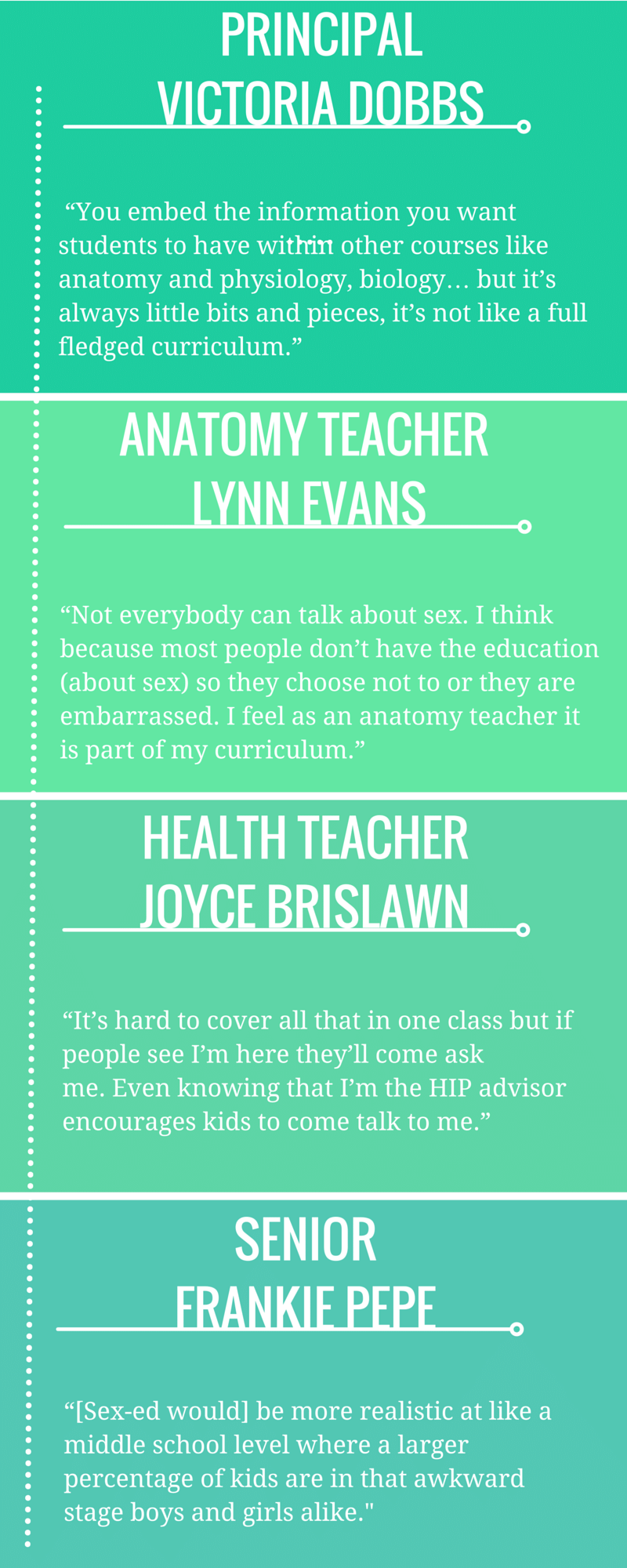Day 11: Palmetto’s Sex Talk
February 11, 2016
In the United States, 23 states require public schools to teach sexual education and 19 states mandate a medically accurate course. Florida is not one of these states. Florida’s guidelines for sex-ed consider abstinence a mandatory topic in the curriculum and teachers must set the curriculum based on what the parents and community see appropriate. Most counties allow parents the option to opt their child out of taking sex-ed (for more state policies click here). Palmetto parents allow their kids to take a portion of sex-ed when they sign a subject selection form that opts for one of the various courses which involve discussion of sexual topics.
“We don’t offer a course in and of itself for sexual education because there’s so much in our curriculum already that to have a class that would last a semester to a year would probably be a course that not too many students would take,” Principal Victoria Dobbs said. “You embed the information you want students to have within other courses like anatomy and physiology, biology… but it’s always little bits and pieces. It’s not like a full fledged curriculum.”
Anatomy teacher Lynn Evans teaches ‘Sex Mondays’ every week, in which she incorporates topics taught in sex-ed curriculums into her anatomy classes. She additionally provides students with a chance to ask their questions anonymously, using a question box. On ‘Sex Mondays,’ Evans discusses each topic presented with her classes so every student gets the same information, including the person who asked the question.
“Not everybody can talk about sex. I think because most people don’t have the education [about sex] so they choose not to or they are embarrassed,” Evans said. “I feel as an anatomy teacher, it is part of my curriculum.”
Evans makes herself available to all students and ensures that the discussion remains medically accurate and confidential. She openly hands out informational books, packets, articles, diagrams and more, to assure the students are properly educated. Whether through an hour long interview, or a two-minute consultation on what to do if one may have contracted an STI, Evans keeps an open door policy.
“If it’s not medically accurate then you’re misleading the kids,” Evans said. “I believe in keeping kids safe so we talk about everything.”
The basics of a sexual education course consist of the anatomy of the human body, physical and emotional risks that accompany having sex, communication between partners, sexual orientation and gender identity, contraception, sexually transmitted infections (including HIV), violence and discrimination. Among these priorities, Evans listed gender equality, communication and trust between the partners and comfort with one’s sexuality in the top three things she would include, if she could design and teach her own sex-ed course. Health teacher Joyce Brislawn listed the anatomy of the reproductive system, sexually transmitted infections, male health and the handling an unexpected pregnancy. She could not pick three.
“It’s hard to cover all that in one class but if people see I’m here they’ll come ask me,” Brislawn said. “Even knowing that I’m the HIP advisor encourages kids to come talk to me.”
Implemented in 45 schools across southern Florida, the Health Information Project (HIP) uses student teachers, also known as Peer Health Educators, to educate freshman every two weeks about topics such as psychological health (bullying, depression and eating disorders), drugs and alcohol, healthy relationships and sex. Although HIP covers sex-related topics, various HIP students agree the topics are too broad.
“We only have one module that deals with sex,” junior and HIP presenter Bryan Borges said. “Each module is an hour.”
Brislawn also serves as the advisor to the HIV Peer Educators, who have presented students and discussed the risky behaviors and causes and effects of HIV.
“[HIP is] not a full curriculum but it’s your peers talking about very important things that others need to know,” Dobbs said.
In 2013, Chicago passed a law that requires all students to learn about sex from kindergarten on. They talk about good touch, bad touch, reproductive organs and their bodies. By fourth grade, students begin learning about the physical, social and emotional aspects of puberty. Illinois, which has a similar birth rate to Florida’s –22.8 per 1,000 girls– proposes the new manner of teaching sex-ed will lower these rates. The National Campaign, meant to prevent teens from unplanned pregnancies, presented these statistics, based on 2014 births and pregnancies amongst every state in the U.S.
“I think appropriate sexual education is absolutely important to teenagers. I think it’s vital information that every student should have,” Dobbs said. “Safety, prevention of pregnancy, more importantly prevention of sexually transmitted diseases and abstinence [should be taught].”
Evans uses articles and videos that emphasize the importance of consent and of students feeling comfortable about their bodies and sexualities, encouraging them to ask her questions if they feel the need. She believes one does not choose who they love, and that it is perfectly fine.
Dobbs encourages students to go to their counselors, who can direct them to a sponsor that answers their questions, whether it is about sexuality, STI’s, sex or any other health concerns they may have.
“There definitely should be a place to go to if they have any questions and never feel embarrassed or ashamed about asking those questions. We do [have those in place] through Ms. Brislawn and some of her groups,” Dobbs said. “Maybe we could do a better job of letting the kids know where they could go.”


